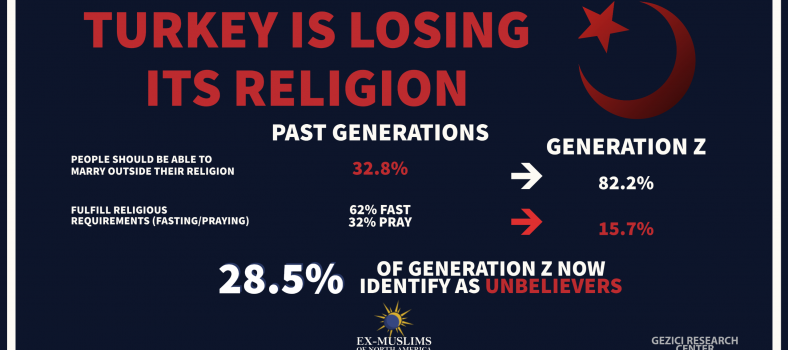Why I left ‘Islam’ and chose not to return
This is a guest post by Soran Tarkhani. He is of Kurdish origin from Iraqi Kurdistan. In addition to working as an assistant lecturer at Salahaddin University in Erbil and is currently pursuing his PhD in political science.
On reading Sidra Mahmood’s response to the VICE News documentary ‘Rescuing Ex-Muslims: Leaving Islam’, I experienced extreme disappointment. Not on account of her response being similar to all those death threats we ex-Muslims often receive for being merely who we are, but more specifically because I realised that even this person who was supposedly once an ex-Muslim herself, still doesn’t want to admit the simple fact that Islam itself is the main reason for leaving it in the first place. Simplifying ex-Muslims issues as though they were just a social issue, clearly demonstrates why Muslims are not yet ready to address this important issue.
To be honest, most ex-Muslims don’t leave Islam because they are not permitted to wear jeans or to watch fireworks. Many Muslims do wear jeans and watch fireworks in their own countries, although they would still harm you if they found out that you had left Islam. Those who leave Islam do so because they value the truth. Leaving Islam is carried out as a result of a long journey to seek the truth concerning the faith. It is a complete misunderstanding to equate disbelief with an attempt to escape a bad relationship with Mohammed, whilst hoping to fall in love again with another better person. This is a complete misunderstanding.
The title of Sidra Mahmood’s article infers that the problem experienced by ex-Muslims is not merely an Islamic problem. She introduces herself as a previous ex-Muslim, who has since returned to Islam, after understanding it’s true essence. In other words, she seems to be making the claim that ex-Muslims are those who don’t understand Islam, buttressed by her personal experience. However, she doesn’t offer any compelling arguments that apostasy is merely a social issue as a result of misunderstanding of Islam.
First and foremost apostasy, the renunciation of a previously held religious faith, is not a new phenomenon in the Islamic world, often attributed to the new age of the internet. Some of the first historical records of Islam, recovered after the death of Mohammad, give an account of war waged upon apostates. Abu Bakr, the first caliph and successor of Mohammad, engaged in a war known as ‘The Reddeh Wars -Wars of Apostasy’ (632- 633 AD). The apostates of the time were told to re-join Islam or face the sword resulting in the deaths of tens of thousands that no longer wished to submit. Unsurprisingly perhaps, the traditional Islamic methods of dealing with apostasy have not changed in the past 14 centuries. According to the Law Library of Congress on apostasy (2014), the vast majority of Muslim countries, (including Afghanistan, Algeria, Bahrain, Brunei, Egypt, Indonesia, Iran, Iraq, Jordan, Kuwait, Lebanon, Libya, Mauritania, Morocco, Oman, Pakistan, Qatar, Saudi Arabia, Sudan, Syria, Tunisia, United Arab Emirates, and Yemen), still carry out legal sanctions for apostasy. Even in a country like Malaysia, which has a moderate Muslim majority in their population, 62% still actively support the death penalty for apostasy (2013 Pew Research Center). Furthermore, a vast majority of Muslims favor Sharia Law over civil contemporary laws, even including those Muslims born in Western countries (2014 Pew Research Center).
To clarify the Islamic stance on apostasy, and how it’s directly related to the doctrine itself, I’m provide here some of the main related Quranic verses and Hadiths :
Quran
Quran (4:89) – They wish that you should disbelieve as they disbelieve, and then you would be equal; therefore take not to yourselves friends of them, until they emigrate in the way of God; then, if they turn their backs, take them, and slay them wherever you find them; take not to yourselves any one of them as friend or helper.
Quran (9:11-12) – But if they repent and establish worship and pay the poor-due, then are they your brethren in religion. We detail Our revelations for a people who have knowledge. And if they break their pledges after their treaty (hath been made with you) and assail your religion, then fight the heads of disbelief – Lo! they have no binding oaths – in order that they may desist.
Hadith and Sira
Bukhari (52:260) – …The Prophet said, ‘If somebody (a Muslim) discards his religion, kill him.’
Bukhari (83:37) – Allah’s Apostle never killed anyone except in one of the following three situations: (1) A person who killed somebody unjustly, was killed (in Qisas,) (2) a married person who committed illegal sexual intercourse and (3) a man who fought against Allah and His Apostle and deserted Islam and became an apostate.
Bukhari (84:57) – [In the words of] Allah’s Apostle, ‘Whoever changed his Islamic religion, then kill him.’
Bukhari (84:64-65) – Allah’s Apostle: ‘During the last days there will appear some young foolish people who will say the best words but their faith will not go beyond their throats (i.e. they will have no faith) and will go out from (leave) their religion as an arrow goes out of the game. So, wherever you find them, kill them, for whoever kills them shall have reward on the Day of Resurrection.’
Abu Dawud (4346) – Was not there a wise man among you who would stand up to him when he saw that I had withheld my hand from accepting his allegiance, and kill him?
While there are other religions that similar harsh measures for those that dare to dissent, those edicts have fallen to the way side. Only in the Muslim world do we still see widespread enforcement and violent retribution for those of us following our conscience. Both major branches of Islam, (Shia and Sunni) at the current moment, support Islamic Sharia Law which dictates that apostates must be sentenced to death.
A fatwa, in the Islamic faith, is the name given to a legal interpretation of Islamic law issues by a learned person, or ‘judge’. Al-Azhar describes apostasy as one of the most heinous of crimes and impels Muslims to kill an apostate immediately if he/she refuses to return to the Islam faith (Dr. Andrew Bostom, 2011). The majority of prominent scholars working in both branches of Islam still postulate that Islamic ‘Sharia’ is the most appropriate way to deal with an issue of apostasy.
Sidra Mahmood, along with others, cites the first part of the verse (2:256) from the Quran as obvious proof that Islam does not prohibit apostasy. She nevertheless disregards the part which clearly defines apostates and non-Muslims as wrong and who mislead people who distrust Allah’s sincere and trustworthy words. I had deeply hoped that apostates held some place within Muslims’ hearts and in Islam. Unfortunately unlike Sidra’s Islam most Muslims do not regard their religion as an open cafeteria from which one can pick and choose elements to satiate ones desires…
Ex-Muslims, born and migrating to Western societies still experience the same problems, are subject to the same threats and social rejection as their counterparts living in Muslim majority societies. The rights of ex-Muslims cannot be achieved merely by dismissive expressions of empathy. The first step to solving a problem is recognizing that there is one…
I titled this article ‘Why I left Islam, and chose not to return’, because I value the truth and yet am afraid of reprisal. However, I can’t simply deceive myself that the earth is flat, that the moon was split in half by a magical figure or by 7th century tribesmen riding on the back of winged horses, from Mecca to space in the blink of an eye. After reading through the Sira ‘Biography’ of Mohammad,’ I would be lying if I suggested I could ever consider him a role model. After studying Islamic history in some detail, I can’t agree that the founder of Islam was a ‘Mercy for Mankind’. I simply can’t close my eyes to what the Quran and Hadiths actually claim. I fully appreciate how hard it is to be an apostate, but I refuse to dismiss my conscience and pretend to subscribe to something I wholeheartedly disagree with.




